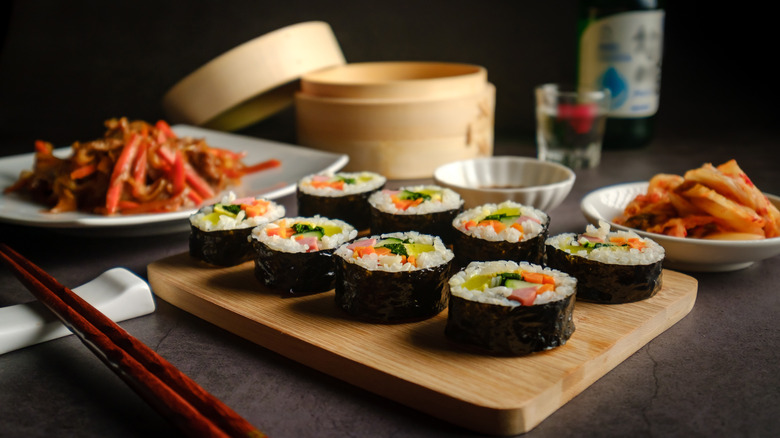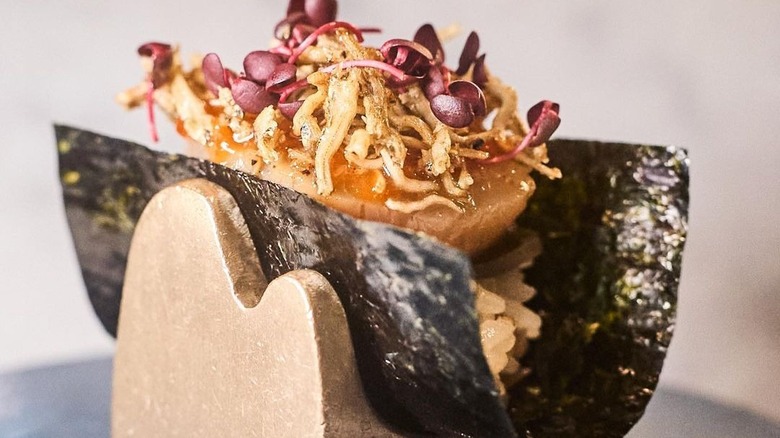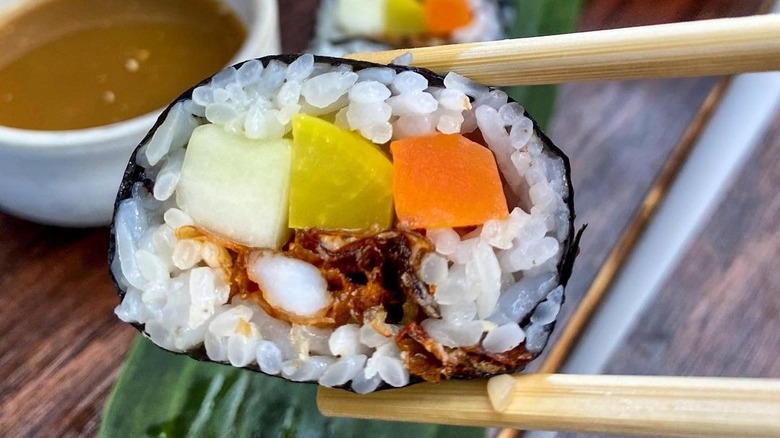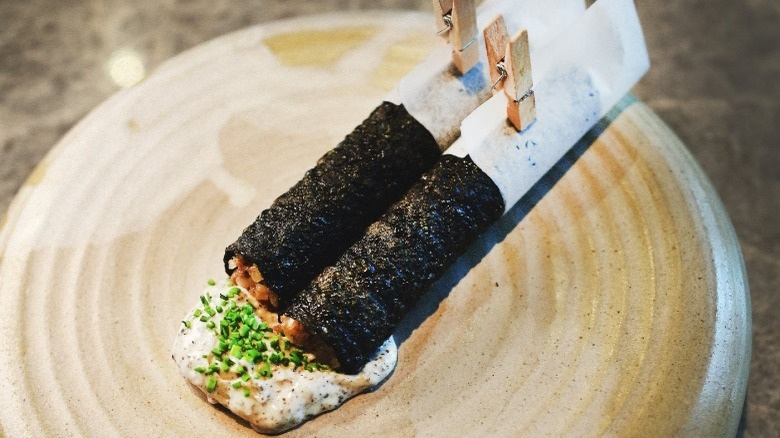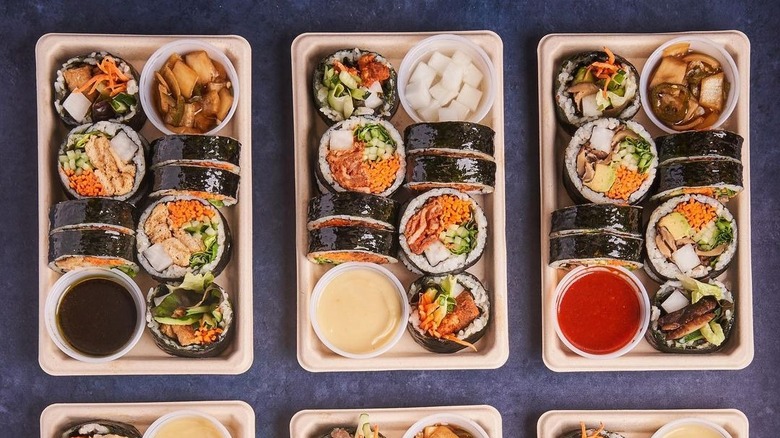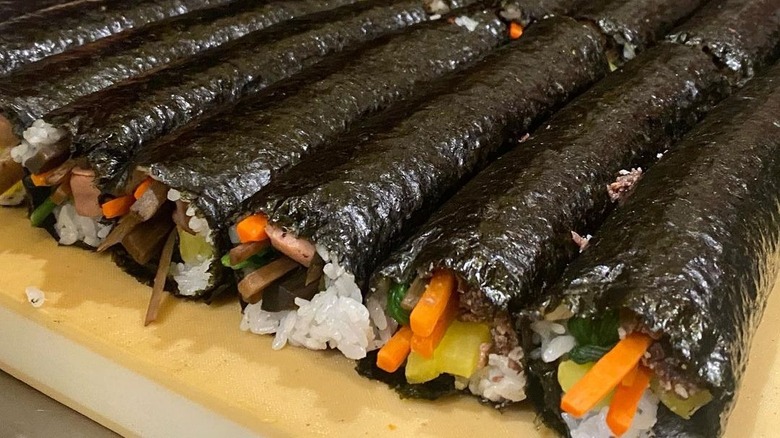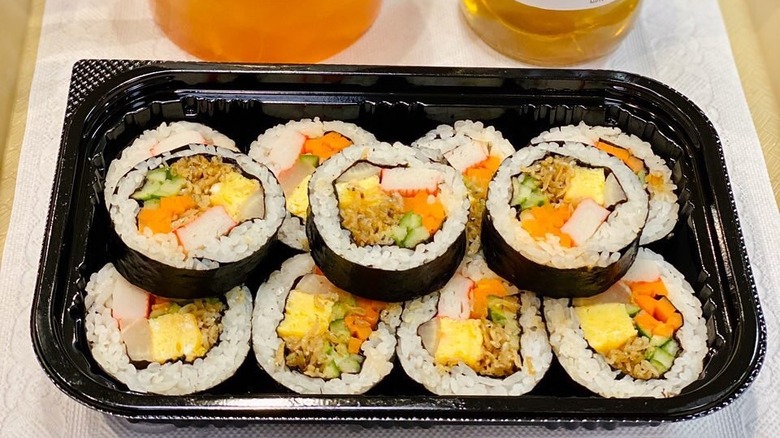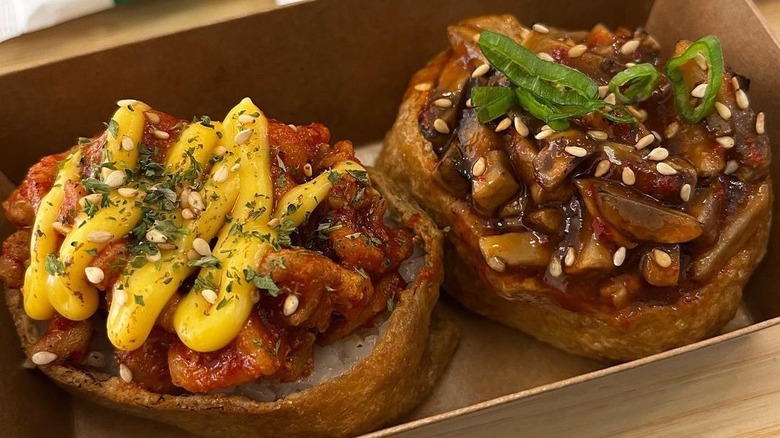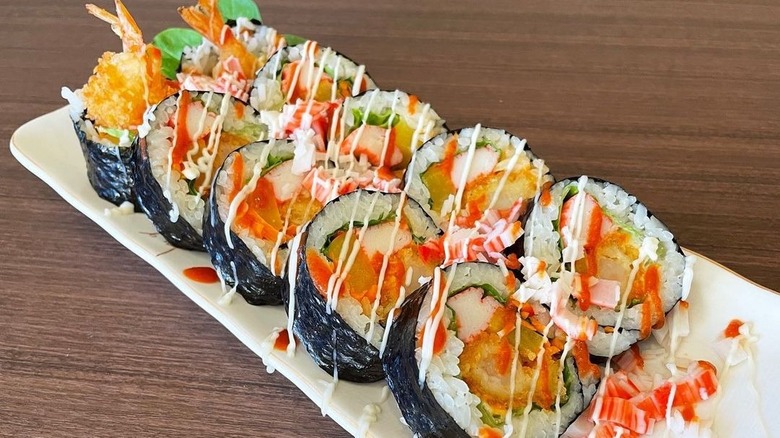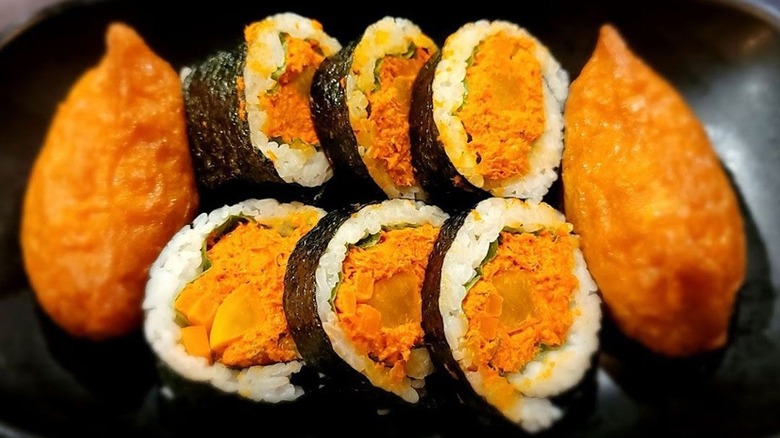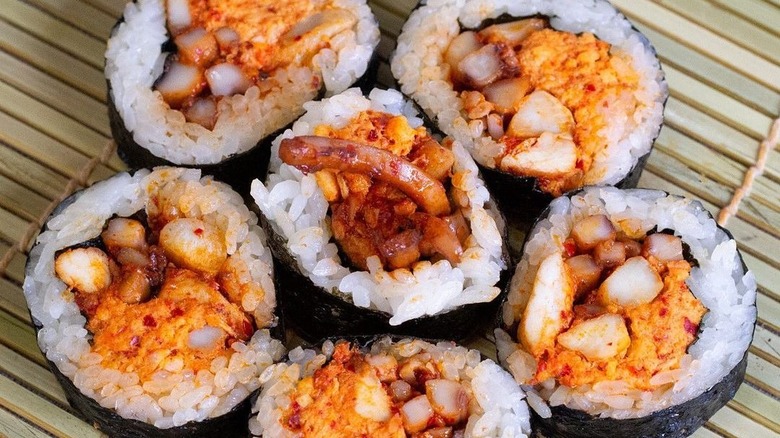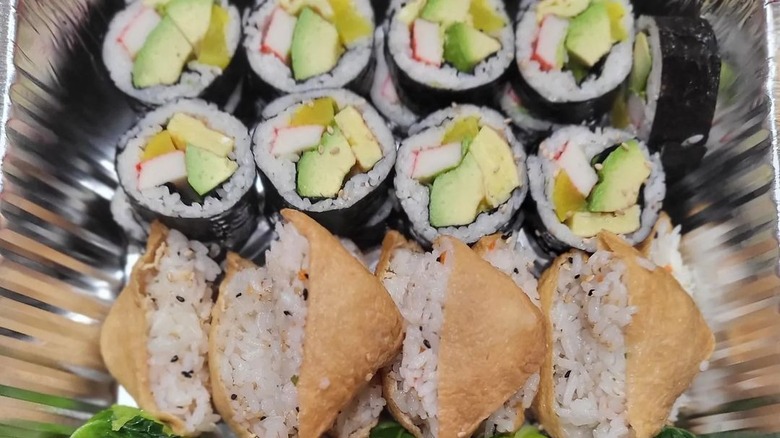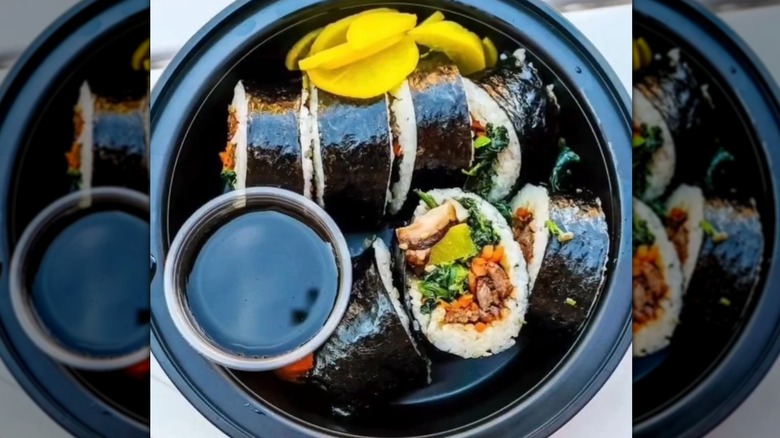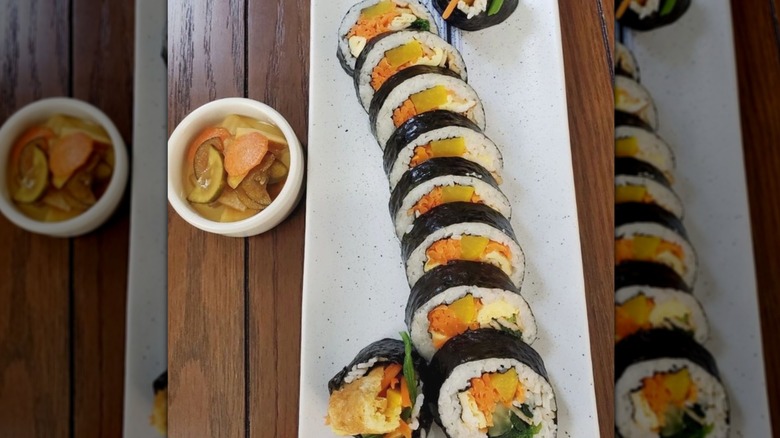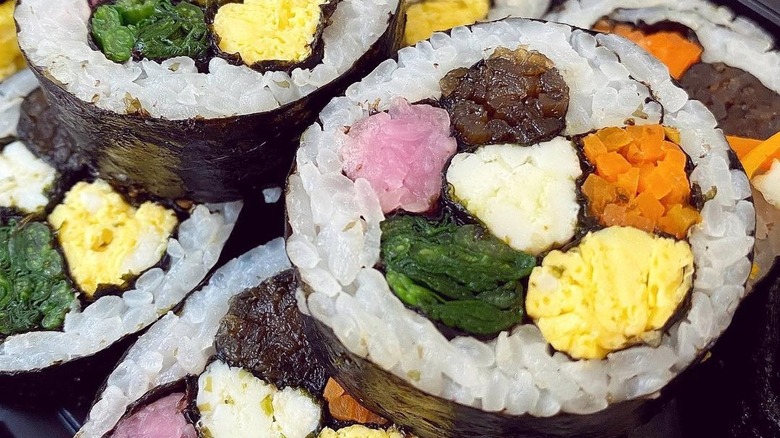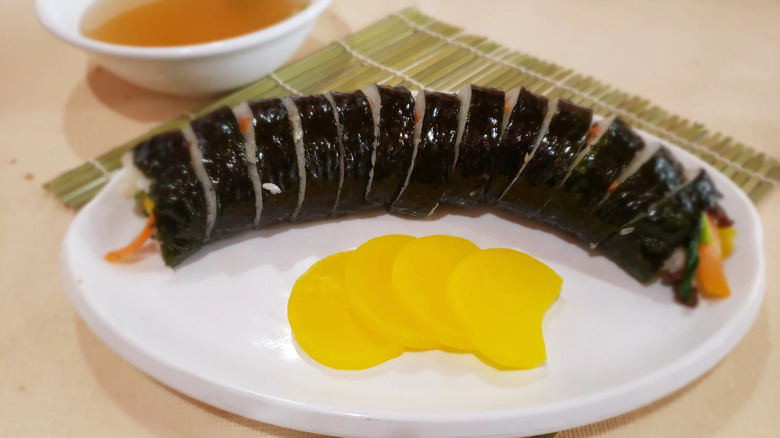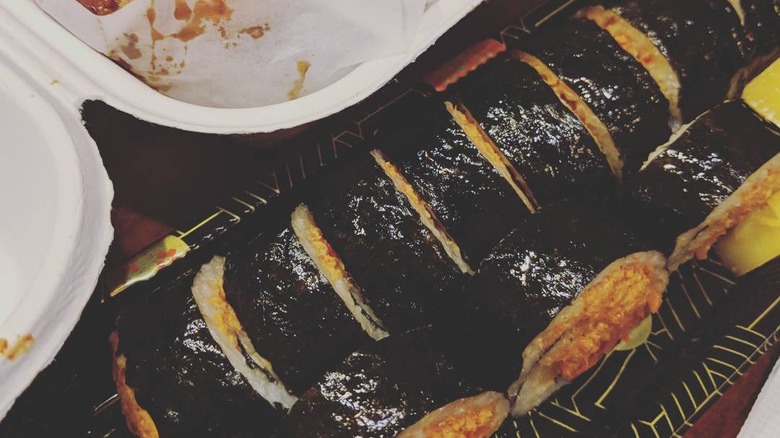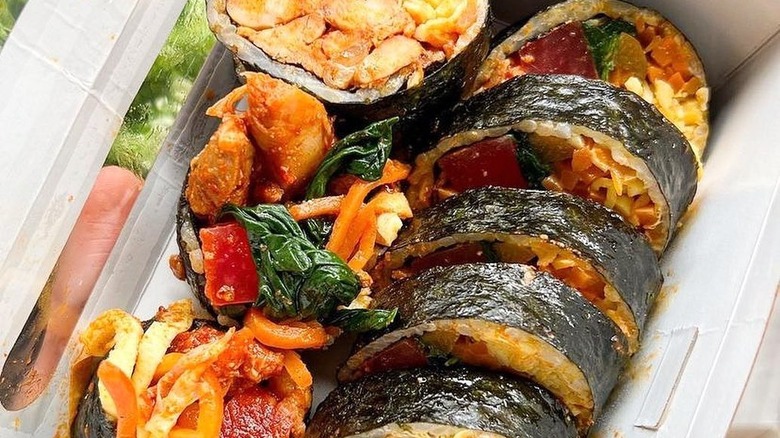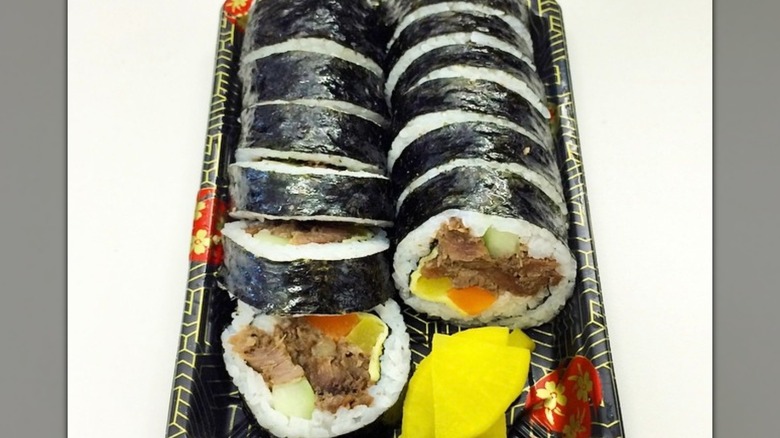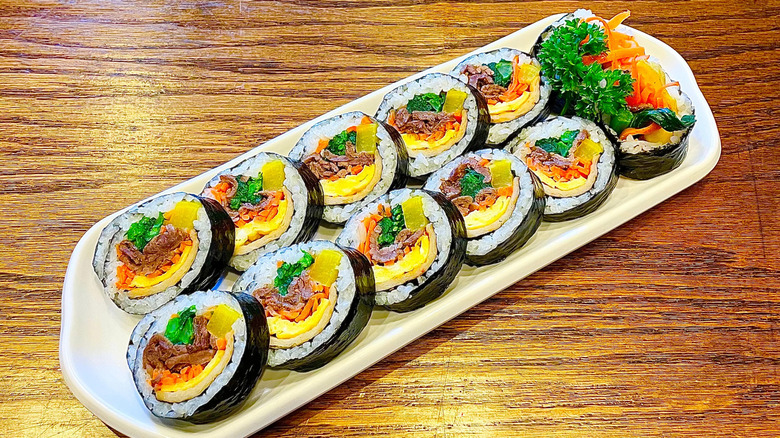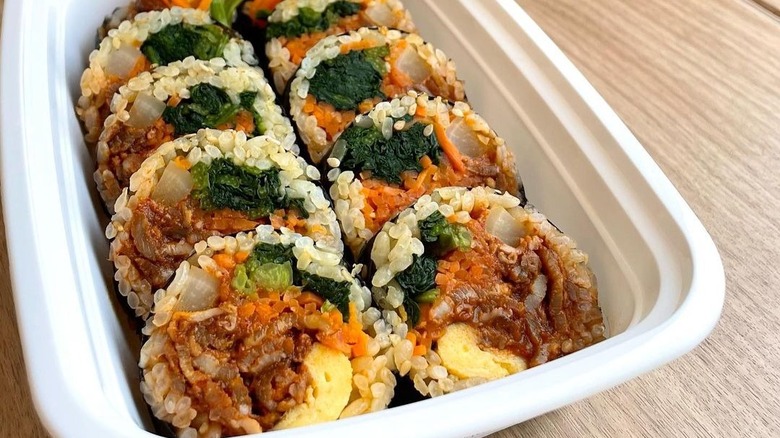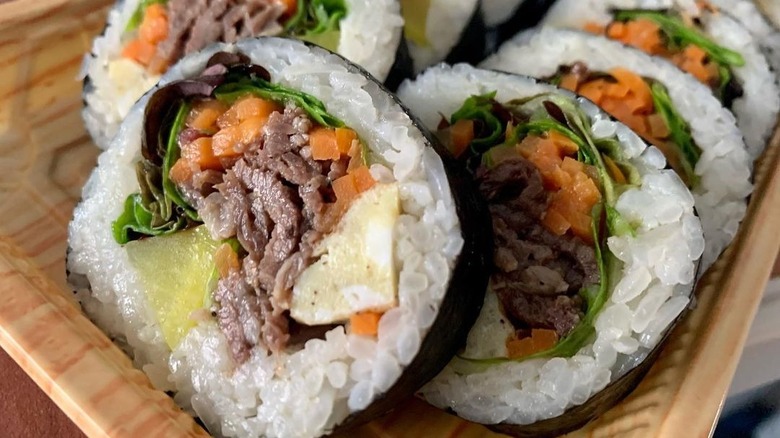21 Best Places To Get Kimbap In NYC
CORRECTION 9/11/23: A previous version of this article stated Little Banchan Shop is in Long Island. It is in Long Island City. Additionally, it was stated that Chung Moo is located in Midtown. It is in Flushing.
Kimbap, a Korean rice roll sandwiching a number of traditional ingredients between a tightly packed dried seaweed wrap, is a big favorite of ours. While similar in appearance to Japanese sushi, you shouldn't try to compare the two or make the wrong assumption they are just Korean and Japanese versions of essentially the same thing. Typically consisting of a few separately prepared ingredients — a variety of cooked poultry, meat, or fish, and both pickled and fresh vegetables — great kimbap typically never employs dips like soy sauce, although Korean chili pastes and spices like gochujang might show up inside the roll.
The popularity of kimbap can't be denied, and perhaps best demonstrated by its struggling to stay in stock at Trader Joe's locations across the country. Of course, Trader Joe's isn't the only place to find amazing kimbap in the U.S., and in New York City specifically, its presence is well known and appreciated. Its popularity on local review pages proves that kimbap is definitely one of many Korean dishes everyone needs to try once, and in New York, you can find outstanding kimbap in every borough.
Mari
Mari is the first Michelin star winner on our list, and for good reason. Located in Hell's Kitchen, this Korean culinary outlet offers a 12-course tasting menu of handrolls — "mari" in Korean — borrowing the aesthetic of Japanese sushi counters for traditional and imaginative Korean fare.
Chef Sungchul Shim is a two-time Michelin Star winner, and he pulls elements like tomato, watermelon, pork shoulder, sweetbread, seasonal veggies, and tteokbokki sauce — a salty-sweet, umami-packed red pepper paste — into winning dishes like Naengguk + Twigim or stir-fried, caramelized anchovies with scallops seasoned in a makgeolli vinaigrette (makgeolli being a thick, sweet and sour Korean rice wine) for some of the most creative kimbap in the city.
The Woo
Buoyed by the energy of artsy Soho, The Woo is a contemporary bi-level Korean restaurant known for its eye-catching modern design aesthetic and mouth-watering eats. Smokeless BBQ grills adorn the center of each table for a smoke-free cooking experience that won't leave you smelling like a campfire but will set you back about $60 per diner.
Although it's not cheap, the food makes it all worth it. Start with a classic Kimbap Sushi Roll with your choice of vegetable, beef, or sea bass tempura and set the tone for the rest of your meal.
Jungsik
When it comes to Korean BBQ, everything you need to know can be learned at Jungsik, an ethereally lit, award-winning fine-dining establishment in Tribeca. The restaurant is named after Chef and Founder Jung Sik but also holds a double meaning in Korean as the expression for a formal dinner.
Menu offerings like yellowtail kimbap are presented on unique earth-toned platters and bowls that pop against the white tablecloths adorning all the tables in the restaurant. Open six days a week Tuesday to Sunday from 5 p.m. to 9 p.m., the restaurant's focus is clearly a monied dinner crowd who won't bat an eye splurging on $115 to $500 wine pairings.
Kimbap Lab
When the name of your restaurant shares the words "kimbap" and "lab," you know that the minds behind the cuisine have put a lot of thought into their creations. Almost a decade after launching the first gluten-free Korean pop-up of its kind in Brooklyn, husband and wife team Chef Wonil and Sarah Lee have won more accolades with Kimbap Lab.
With locations in Williamsburg and Chelsea Market, you know there must be great kimbap behind the clamor for more. Bulgogi beef kimbap rolls, spicy chicken, and spicy pork cover diners' carnivorous cravings, while mushroom/avocado kimbap or yubu kimbap rolls round out the vegetarian offerings. Do yourself a favor and pre-order to avoid the inevitable wait.
E-Mo
E-MO may not play with your emotions, but the restaurant's kimbap will make you happy. As one of the best restaurants in NYC's Koreatown specializing exclusively in kimbap, we suggest making the journey here if you enjoy this Korean cultural staple. Due to a tight space suited for takeout orders, E-MO isn't where you want to go for the sit-down restaurant experience. Each roll is made to order, and like the work of any craftsperson, the wait attached to that care is worth it.
Cheap and cheerful at about $5 per dozen piece kimbap, the rolls here are also substantial enough to ensure nobody stays hungry after eating them. Aside from the usual spicy proteins, seafood like squid and tuna are along for the ride, professionally wrapped with pickled and cooked veggies like turnip and spinach. Grab an authentic, imported Korean beverage to wash it all down.
Woorijip
It's a safe bet that Koreatown likely contains the most kimbap per square inch, and Woorijip is another contender when it comes to kimbap in the neighborhood. There's a plethora of roll fillings options at this buffet-style establishment, although unique options like fish cake or the intriguing spam and egg roll kimbap show unexpected and playful creativity. The use of wild rice instead of the standard white sticky rice in a vegetarian kimchi kimbap is also a unique but health-conscious twist.
Inflation hasn't appeared to hit the kimbap market — at least not at Woorijip — all the rolls are priced comfortably between $4 to $8, with spicy pork being the most expensive item on the menu. Eat in at this casual dining spot, or walk a block over to the park at 6th Avenue and enjoy your Kimbap with a side of people-watching.
YUBU
YUBU is another popular player in Manhattan's kimbap market, with storefront locations in the East Village and Soho. While the Village spot is mainly for delivery or takeout with the exception of a few tables outside the store, the Soho location, while not much larger, offers more indoor seating for dining in.
While maybe not a true kimbap experience — the rolls are also wrapped with tofu skins as opposed to rice — the fillings within still make YUBU another Korean restaurant to try out. Stir-fried spicy marinated chicken thigh and crabmeat or fish roe with Myungran mayo are a few of the more unique items on order here. Iced matcha lattes and Korean sodas like Milkis — a carbonated dairy soda made with milk and yogurt— are great accompaniments to your meal.
Yoodon
Yoodon is Bayside, Queens' answer for lovers of authentic Korean kimbap. While not as intensive as some of the prior listed restaurants, you can enjoy a nicely presented dish delivered to your door with a side of soup which, at a price point of $10.95 to $12.95 for five different kinds of kimbap, seems fair to us.
Bulgogi, spicy shrimp tempura, spicy crab, salad, and Yoodon's specialty kimbap roll round out the rice roll offerings at Yoodon. Beverages are pretty standard drink fare, with a few kinds of pop and bottled water on offer. Takeout or delivery are the only options here, but a restaurant isn't necessarily good just because you can sit down at it, as evidenced by how delicious this place is.
Kimganae
KimGaNae is a casual Korean restaurant with dine-in, takeout, and delivery options located at the eUnionSt Marketplace in Flushing. With 16 kimbap rolls on the menu, it would be pretty difficult to walk out of the restaurant without finding something to eat out of that selection. Prices come back down to orbit here and fluctuate between $5 and $10 for service.
Some of the more interesting menu items include a selection of proteins — spicy tuna, squid, and beef — with fried tofu rice balls. Vegetarians get the same deal but with kimchi or mushrooms. For an extra dollar each you can add sesame leaf, kimchi, hot pepper, mushroom, cheese, egg, or sausage to your kimbap. Open seven days a week from 8 a.m. to 10:30 p.m., you'll have plenty of opportunity to enjoy the restaurant's many kimbap options.
Nolbu Nolbu
Nolbu Nolbu is a 20-year veteran kimbap spot in Flushing, Queens, and boasts more than 30 different made-to-order kimbap rolls. This nondescript mom-and-pop establishment isn't at all fancy, but the lack of design aesthetic has no bearing on the food. While everything looks good, there are a few lesser-seen menu items that deserve your attention.
The Nolbu manura kimbap with leeks, pickled radish, anchovies, carrots, and hot peppers, and the Prince Kimbap with spicy BBQ chicken and spicy squid are interesting if for no other reason than they are specific to the restaurant. Nolbu Nolbu is open every day from 7 a.m. to 9 p.m.
Korean BTS Market
Bedford-Stuyvesant's Korean BTS Market is just that, a corner store where you'll find a whole lot of flowers and plant life as well as Korean eats to go. This is an outlier as the market isn't really a restaurant, but it deserves a place on this list because of the traditional Korean grandma cuisine available for takeout and delivery.
There are four main types available from $7.99 to $8.99 in price. Tuna, bulgogi, avocado imitation crab, and a basic cheese kimbap keep the lineup short and sweet. Korean BTS Market's brick-and-mortar market is open every day from 8 a.m. to 9 p.m. while its entire food menu is available for order from 11:30 a.m. to 8:20 p.m.
Syko
Syko, a family-run affair between Syrian Chef Mazen Khoury and Korean Chef James Kim in South Slope, Brooklyn, is a playful amalgamation of their home countries and the nickname given to Kim's son. As opposed to fusion cuisine, the pair instead rely on playful interpretations of their unique cultural dishes. For Kim, that includes kimbap.
While most of Syko's business is based on takeout and delivery, there is some seating both inside and outside the restaurant. Halal beef and chicken that isn't used by Khoury in kibbeh, shawarma, or kebab ends up in Kim's bulgogi or chicken kimbap. The addition of spinach, pickled radish, shiitake mushrooms, zucchini, and carrots gives the halal a specifically Korean flavor base. Syko is open for lunch and dinner from Tuesday to Sunday 11 a.m. to 9 p.m. and weekend brunch until 2:30 p.m.
Woori Korean
Woori Korean ("woori" meaning "our Korean" in English) is a compact but bright and airy space offering takeout, delivery, and seated dining options in Clinton Hill, Brooklyn. Although its kimbap options are rather limited to three choices, they are expertly crafted and flavorful.
Vegetable, bulgogi with fishcake, and tuna kimbap with egg employ pickled radish, carrots, spinach, and cucumber to great effect. Woori Korean is open six days a week from 11 a.m. til 9 p.m. (and 10 p.m. from Thursday to Saturday).
Ejen Korean Comfort Food
Ejen Korean Comfort Food is one of the over 50 food outlets in Brooklyn's Industry City, a multi-use, reimagined industrial area repurposed for retail, education, and New York culture in Sunset Park. "Ejen" which translates from Korean into "now," is a contemporary, modern restaurant with so much respect for older cultural traditions that the owner Jenny Jiae Lee's parents are actually working in the kitchen. Bright lights, sharp lines, and muted earth tones belie the traditional techniques churning out authentic Korean food, some of which include kimbap.
For $14, you can get a roll consisting of carrots, spinach, burdock root, pickled radish, egg, beef bulgogi, and dried seaweed. You can also go vegetarian and opt out of the beef bulgogi. Dine-in or pickup six days a week from Tuesday to Sunday.
Chung Moo
Chung Moo is a Flushing, Queens mainstay with a boisterous environment fueled by Korean BBQ and cultural classics. The restaurant pays as much attention to the kimbap as it does the BBQ, offering 18 different kinds of kimbap on the menu. The cost of each runs anywhere from $8 to $13, and of particular interest are the pork cutlet roll and kimchi beef roll.
Chung Moo is open seven days a week from 7 a.m. to 9 p.m. but currently only offers pickup or dine-in options. Luckily, every night is a party at Chung Moo, so leaving your home for some kimbap seems like less of a hassle than an adventure.
Korean Express
Korean Express is where you go for a fantastic kimbap to go in a hurry in Midtown Manhattan. This suits the lifestyle of most New Yorkers perfectly, so it's no wonder that Korean Express retains its loyal customer base with all of the other competing restaurants in the city. Reliably open Monday to Sunday from 11:30 a.m. to 9 p.m., you can speed up the process of picking up your food by pre-ordering online or having it delivered to your door.
Four kimbap options include vegetarian, bulgogi, tuna, and spicy tuna. Korean Express is so on point with the speediness of the food that it even offers an ASAP 15-minute window for pickup.
Rice Kitchen
Rice Kitchen, located in Soho, is a tiny but immaculate space with no more than a handful of outdoor seating and a side counter to stand and nosh. Half a dozen kimbap offerings include some interesting selections like Black sesame tuna salad and K chicken kimbap, a rice roll made with sweet and spicy chicken.
In terms of price, all the kimbap are $12.50, so definitely on the pricier side of many similar storefront restaurants on this list. But it is Soho, so that's probably to be expected. Rice Kitchen is open every day from 11:30 a.m. to 7:30 p.m. and allows for online pickup orders and delivery.
KoFoo
KoFoo, a Korean rice bar inside The Four Seasons Cafe in Flatiron, has an impressive array of 10 kimbap options for connoisseurs. It would be fair to assume a connection to The Four Seasons lends itself to high quality, and KoFoo does not disappoint in that regard.
Better still, none of the kimbap rises over $12, so you get the Four Seasons-level food with K-Town prices and a mom-and-pop aesthetic. Delivery and takeout hours are 11 a.m. to 8 p.m., while dining service starts early — 6 a.m. during the week and 7 a.m. on weekends.
Doma Korean
Doma Korean, located in the Sunnyside neighborhood of Queens, has been serving Korean fare as far back as the first Instagram post in 2016. While the Instagram page has fallen off, the restaurant is still going strong.
Kimbap figures into that equation with five different options available on the menu. If you're feeling a little adventurous, try the dragon eel for something different. You also can't go wrong with the house favorite bulgogi kimbap.
Little Banchan Shop
Long Island City's Little Banchan Shop draws on the Seoul, South Korean tradition of tiny mom-and-pop shops that specialize in quick grab-and-go side meals. Korean American chef Hooni Kim brought the banchan concept to New York and expanded it to include entrées as well as small bites. The tiny space offers little in the way of seating, with the exception of a bench by the window.
For $11 to $12 enjoy spicy pork wrapped in seasoned rice and dried seaweed, filled with BBQ pork shoulder adorned with gochujang paste, and an egg omelet with pickled daikon with veg. Slivers of BBQ prime beef brisket follow the same pattern in the bulgogi kimbap, and a vegetarian kimbap employs tofu skin alongside an egg omelet as the protein. Pre-order for takeout or delivery.
Momo 97
Momo 97 is another shoebox-shaped and sized takeout and delivery spot in East Harlem, New York. Unlike many Korean takeout restaurants in the city, Momo 97 can actually boast table seating for a handful of diners on a single bench placed lengthwise against the west wall. A neon sign with the restaurant's name glows overhead.
Five kinds of Kimbap on offer include the usual suspects bulgogi, spicy and regular tuna, and kimchi. Of particular interest is a shrimp kimbap, which surprisingly hasn't shown up very often on the menus on this list. Decently priced from $9.95 to $10.95, GrubHub gives this place 92% out of 901 ratings. High praise for this hole in the wall in Harlem.
